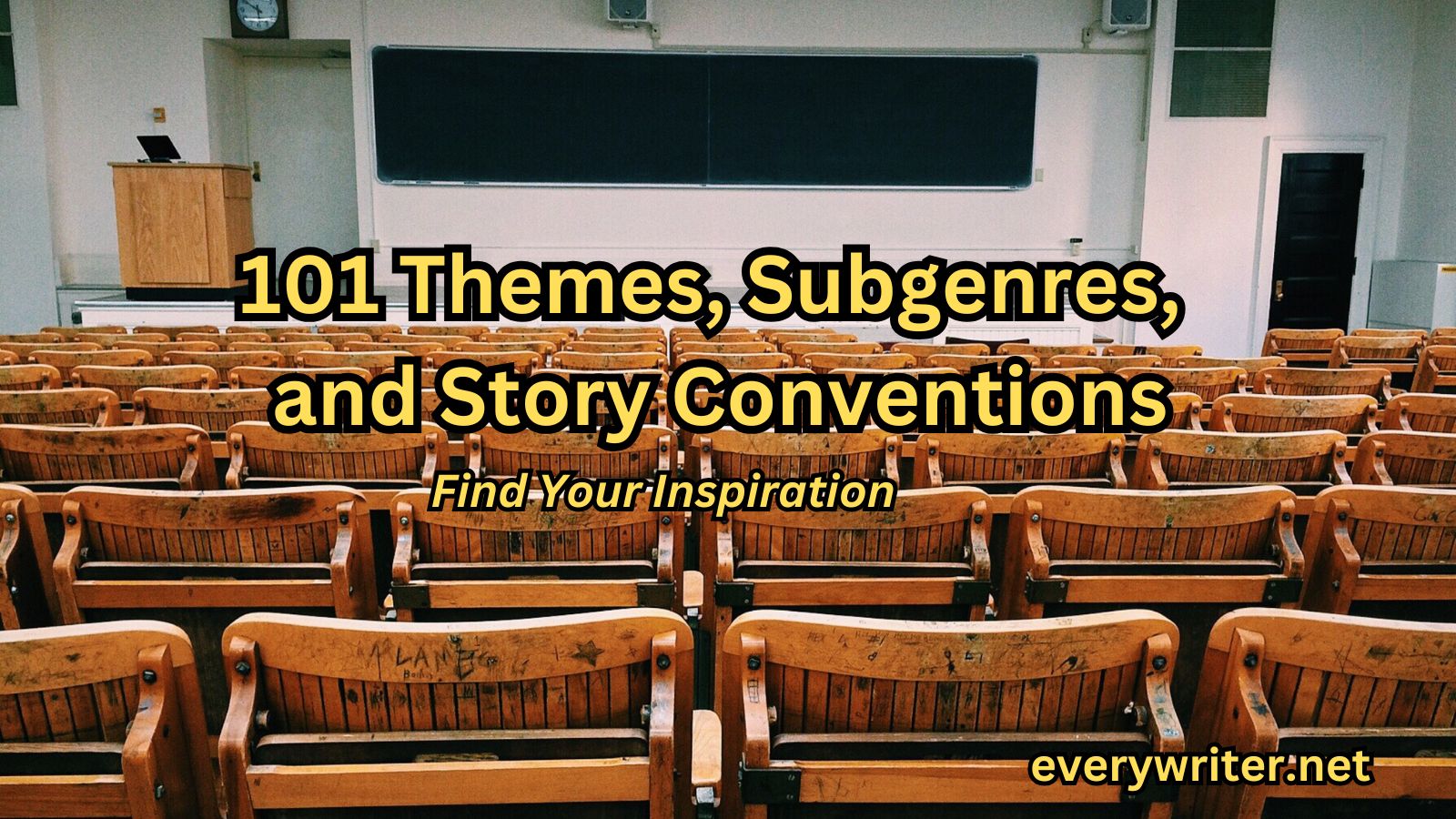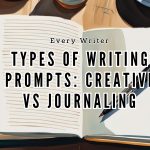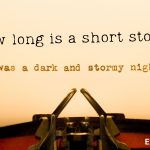101 Themes, Subgenres, and Story Conventions
This expansive list contains 101 themes, subgenres, and story conventions that writers can explore in short stories and novels. The list ranges from broad categories like “coming-of-age” and “animal transformation” to subtypes or subgenres like “addiction recovery” and “campus novel.” These varied labels offer a glimpse into the endless possibilities for fictional narratives. For writers unsure where their tale may lead, perusing a list like this could spark inspiration on potential directions. Even for authors with a clear trajectory planned, reading through these creative conventions can still prove worthwhile to appreciate the diversity of creative forms. Whatever one’s familiarity with fiction writing, this compilation has something to offer every reader. These 101 ideas showcase the boundless breadth of storytelling traditions, and with any luck, they may kindle promising new narrative concepts. Most importantly, may these themes ignite your imagination and love of writing.
Hello fellow writers, I’m so happy you dropped by for our 101 themes! I love lists like this, as you might be able to tell. I’m a bit obsessive and have been writing these kinds of things for years. There’s something so satisfying about categorizing and cataloging the infinite ways we tell stories, don’t you think?
I truly believe these lists can spark your creativity when you’re staring at that blank page, wondering which direction to take your protagonist. Or maybe you’ll discover a subgenre you didn’t even know existed! That’s the beauty of our craft – just when you think you’ve seen it all, there’s always another narrative path to explore.
Sometimes when I’m stuck, I’ll close my eyes, point randomly at my list, and challenge myself to incorporate that theme into whatever I’m working on. You’d be surprised how often this little exercise breathes new life into a stagnant draft!
Whether you’re a seasoned novelist or just starting your first short story, I hope this compilation gives you that little nudge of inspiration you might need. We’re all in this together, after all – sharing our collective wisdom about this craft we love so dearly.
So grab your favorite beverage, get comfy, and dive into these 101 narrative traditions. And if something catches your eye or sparks an idea, I’d love to hear about it in the comments! Nothing makes me happier than knowing these obsessive little lists of mine have helped a fellow writer find their way.
Understanding Themes in Fiction
I’m back with more obsessive thoughts about storytelling! Let’s chat about themes – those beautiful, sometimes elusive threads that weave through our narratives.
Themes are the underlying messages or big ideas that our stories communicate to readers. They’re what our stories are really about, beneath all the plot twists and character development. Think of love, betrayal, redemption, the loss of innocence, or the corrupting nature of power – these are all themes that have captivated readers for centuries!
I like to think of themes as the “so what?” of your story. Your protagonist defeated the villain? Great! But… so what? What does that victory say about courage, sacrifice, or the human condition? That’s where theme comes in.
Sometimes I discover my themes organically as I write (I’m a pantser that way), while other times I deliberately choose a theme before I even create my characters (when I’m in a plotter mood). Either approach works! The important thing is that your theme gives your story cohesion and meaning beyond just “stuff that happens.”
The most powerful themes often emerge when they’re shown rather than explicitly stated. Nobody wants to read a lecture! Instead, let your characters’ choices, the consequences they face, and the evolution of your plot naturally illustrate your theme. Trust your readers to connect those dots – they’re clever that way!
Exploring Subgenres in Fiction
Oh my goodness, subgenres! As a list-maker extraordinaire, I could talk about subgenres ALL day long. Aren’t they fascinating? They’re like little literary ecosystems, each with their own rules, expectations, and devoted readers.
Subgenres are those wonderful subcategories within broader genres that help us get super specific about what kind of story we’re telling. Think of how “romance” breaks down into historical romance, paranormal romance, romantic suspense… I have spreadsheets tracking these distinctions (I told you I was obsessive!).
What I love most about subgenres is how they blend and morph over time. Remember when “dystopian YA” exploded after The Hunger Games? Or how “cozy fantasy” has been gaining traction lately? These subgenres didn’t exist in their current form decades ago!
When you’re writing, knowing your subgenre can be incredibly helpful for understanding reader expectations. If you’re crafting a “locked-room mystery,” your readers will be scrutinizing every detail, looking for clues. If you’re penning a “space opera,” they’ll be expecting grand-scale conflict with emotional resonance.
Don’t be afraid to mix subgenres either – some of the most exciting fiction emerges from these crossovers. Imagine a “gothic paranormal romance” or a “tech noir mystery”! The possibilities are endless!
Story Conventions: The Building Blocks of Storytelling
Let’s talk about story conventions – those tried-and-true storytelling patterns and techniques that readers instinctively recognize. I’ve collected these like trading cards over the years!
Story conventions are those familiar structures and devices that give readers a sense of what to expect. They’re not clichés (though they can become clichés if handled poorly). Instead, they’re like comfortable landmarks in the narrative journey.
Take the “chosen one” convention, for example. We’ve seen it countless times – an ordinary character discovers they have a special destiny. Or the “enemies-to-lovers” convention in romance. These patterns work because they tap into something fundamental about human experience and storytelling.
What I find most interesting about conventions is how they can be played straight, subverted, lampshaded, or reinvented. Sometimes following a convention perfectly gives readers exactly the satisfaction they’re seeking. Other times, twisting a convention on its head can create something brilliantly unexpected!
When I’m stuck in my writing, I often look at my list of story conventions for inspiration. Could my contemporary fiction benefit from a “fish out of water” scenario? Should my fantasy include a “coming of age” journey? These building blocks have endless creative potential when you mix and match them with intention.
Transformation and Growth Narratives
- Coming-of-age – Chronicles a young protagonist’s transition to adulthood, depicting psychological, moral, and social maturation
- Awakening story – Features a protagonist gaining greater awareness about life, society, or themselves
- Self-discovery – Emphasizes the protagonist’s inner journey of self-realization and personal growth
- Redemption story – Follows a morally flawed protagonist who atones for past mistakes
- Empowerment story – Depicts a protagonist gaining agency, strength, confidence, or freedom
- Recovery story – Shows a protagonist overcoming addiction or illness through inner strength
- Metamorphosis story – Explores a protagonist undergoing profound physical or mental change
- Self-actualization – Highlights the protagonist’s journey to fully realize their potential
Challenge and Adversity Themes
- Underdog story – A disadvantaged protagonist beats the odds through perseverance
- Survival story – Forces the protagonist to tap into inner strength to survive an ordeal
- Overcoming disability – Shows a protagonist transcending limitations through perseverance
- Breaking away story – Features a protagonist rebelling against traditions and expectations
- Escape story – Depicts a protagonist breaking free from oppressive situations
- Emancipation stories – Shows a protagonist gaining independence by overcoming constraints
- Trials of conscience story – Presents a protagonist facing moral dilemmas that test their values
Setting-Based Narrative Structures
Educational and Institutional Settings
- Campus novel – Takes place at university settings where college life signifies transition to adulthood
- Boarding school novel – Explores socialization, competition, friendship, and authority within structured settings
- Education novel – Features formal schooling prominently in the protagonist’s growth
- Apprenticeship novel – Shows a protagonist learning through hands-on experience with a mentor
- Gymnasium novel – Set in schools with focus on adolescence and formative experiences
Environmental and Natural Settings
- Ecofiction – Speculative stories exploring environmental collapse and human impact on nature
- Self-discovery in nature – Protagonist achieves insights through meaningful encounters in natural settings
- Initiation through nature – Character maturation through challenging experiences in wilderness settings
- Robinsonade – Resourceful protagonist survives alone in nature against overwhelming odds
- Travel story – Protagonist gains worldliness through journeys to unfamiliar places
Genre-Specific Narrative Conventions
Speculative and Supernatural Elements
- Magical realism – Realistic fiction subtly infused with elements of fantasy, myth, and magic
- Ghost story – Features supernatural entities returning from death to influence living characters
- Haunting story – Protagonist confronts supernatural or psychological haunting presence
- Afterlife journey – Character experiences revelations through metaphorical afterlife experiences
- Afterlife story – A glimpse of the afterlife changes the protagonist’s perspective on life
- Biopunk story – Experimental biological or genetic modifications impact the protagonist
- Time travel story – Character travels across time periods and returns transformed
- First contact story – Protagonist encounters alien life, permanently altering their worldview
Transformation and Identity Narratives
- Animal transformation – Protagonist metaphorically develops by transforming into representative animal
- Shapeshifter story – Character transforms between human and animal forms
- Monster transformation – A monster transforms into human form after moral growth
- Reverse monster transformation – Human transforms into monster through moral decline
- Mind swap story – Protagonist switches bodies/minds with another character, gaining perspective
- Changeling story – Character discovers they were secretly switched at birth
- Secret origin story – Protagonist uncovers secrets explaining their forgotten origins
- Superhero origin story – Character gains extraordinary abilities and chooses how to use them
Psychological and Emotional Journey Themes
Internal Growth and Realization
- Epiphany story – Protagonist achieves sudden insight that transforms their worldview
- Revelation story – Character experiences spiritual or philosophical awakening
- Catharsis story – Features psychological release through intense emotional experience
- Healing story – Shows overcoming psychological or spiritual brokenness to become whole
- Learning by teaching story – Mentor imparts wisdom but learns valuable lessons themselves
- Rebirth story – Through symbolic death and rebirth, protagonist begins life anew
- Quest for identity – Character seeks to discover their authentic self, origins, and purpose
Challenging Psychological Journeys
- Descent into madness story – Charts protagonist’s mental deterioration into psychosis
- Disillusionment story – Shows character losing naive idealism through harsh experience
- Corruption story – Innocent protagonist loses naivete through exposure to harsh realities
- Fall from grace story – Respected protagonist experiences disgrace through moral lapses
- Fall from innocence – Traumatic event ends protagonist’s naive youthful outlook
- Psychological thriller – Character’s precarious mental state drives tension and conflict
- Failure story – Protagonist fails to attain conventional success but gains inner wisdom
Life Stage and Transition Narratives
Youth and Maturation
- Puberty novel – Emphasizes physical changes as primary markers of adolescent development
- Loss of innocence – Depicts formative experiences shattering protagonist’s naivete
- Youth culture – Explores peer socialization, conventions, and dynamics of adolescence
- Forced maturity story – Harsh circumstances compel child protagonist to grow up quickly
- Initiation story – Chronicles childhood events signifying first steps toward adulthood
Adult Transitions and Challenges
- Quarterlife crisis novel – Explores twenty-somethings navigating identity struggles
- Gap year novel – Character takes time between education stages to find themselves
- Feminine maturity story – Female protagonist actualizes identity and potential as woman
- Masculine maturity story – Male protagonist proves manhood by overcoming challenges
- Rite of passage – Character undergoes significant ritual marking transition to adulthood
Cultural and Social Narrative Frameworks
Social Identity and Integration
- Immigrant experience – Protagonist adapts to new culture while finding place in homeland
- Fish out of water – Naive character thrust into unfamiliar social environment
- Social transition – Underscores advancement through education and class mobility
- Societal integration – Highlights finding place in society through adult rituals
- Social justice story – Character finds purpose through confronting inequality
Cultural and Historical Perspectives
- Counterculture story – Protagonist rejects mainstream values during personal journey
- Family saga – Development unfolds across generations through family history
- Southern gothic – Dark stories featuring eccentric or flawed characters in American South
- War and trauma – Wartime events force protagonist to confront mortality and violence
- Stories of nostalgia – Character reflects on idealized childhood before maturity
Literary Tradition Classifications
Classical Narrative Structures
- Entwicklungsroman – German term for developmental coming-of-age narratives
- Erziehungsroman – German term for novels focused on systematic education
- Künstlerroman – Narratives about artist’s growth to maturity in their craft
- Quest novel – Structured around protagonist’s search for identity and purpose
- Cautionary tale – Character’s flaws lead to moral downfall, serving as warning
Specialized Literary Forms
- Portrait of the artist – Highlights intellectual and artistic development of creator
- Slice of life – Impressionistic glimpses into everyday events and characters
- Tragedy – Protagonist experiences catastrophic downfall through personal flaws
- Voyage and return – Character journeys to unfamiliar realm and returns transformed
- Stories of vocation – Protagonist searches for calling in career or creative passion
Additional Compelling Narrative Structures
- Addiction/recovery arc – Journey from substance dependence to sobriety and growth
- Chosen one story – Unlikely protagonist discovers special destiny to fulfill
- Coming of technology story – New technology disrupts protagonist’s world
- Fallen hero story – Respected hero experiences disgrace or corruption
- Riches to rags – Wealthy protagonist loses status but gains wisdom
- Rags to riches – Character transcends poverty through hard work or fortune
- Reluctant hero story – Ordinary protagonist rises to extraordinary challenges
- Revenge story – Character seeks vengeance for past wrongs
- Sacrifice story – Protagonist surrenders something valuable for greater purpose
- Sports story – Character achieves symbolic “win” paralleling psychological growth
- Success story – Protagonist achieves conventional success through determination
- Temptation story – Character is led astray but ultimately resists through strength
- Tested faith story – Protagonist’s beliefs are challenged but ultimately reaffirmed
- Transformation story – Character experiences radical change in outlook or being
- Regression story – Protagonist becomes more childlike in response to trauma
- Riddle – Question poem posing puzzle with metaphorical language
The Journey Continues…
Good luck on your writing adventures, my fellow storytellers! I hope this list has sparked your imagination and given you some fresh ideas to explore in your work. Whether you’re drafting your first short story or your tenth novel, remember that these themes, subgenres, and conventions are simply tools in your creative toolkit – use them, bend them, or break them entirely as your story demands!
I’d absolutely love to hear from you in the comments: What’s your favorite theme in fiction? Are you drawn to redemption arcs, coming-of-age journeys, or perhaps those deliciously complex moral dilemmas? Your answers might just inspire another writer who’s browsing through these comments!
Thanks so much for reading my slightly obsessive cataloging of storytelling traditions. Now go forth and write something wonderful!
- 100 Screenwriting Ideas to Get You Writing - January 20, 2026
- 100 Winter Storm Writing Prompts - January 17, 2026
- 100 Haunted House Story Starters: Craft Your Scariest Tale Yet - January 10, 2026





